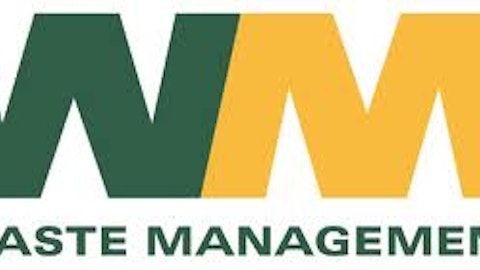Boring industries are generally the best place to find bargains. While high-flying stocks like Tesla Motors Inc (NASDAQ:TSLA) receive all the attention, companies with more mundane prospects often go neglected. Enterprising investors will find the neglected industries much more interesting than the highly touted, and overvalued, stocks of the day.

Waste Management, Inc. (NYSE:WM) is the largest company in the industry. Its fortunes rise and fall with industry volume, which has fallen quite a bit over the last decade. As a result, investors are uneasy about the company’s prospects.
Although Waste Management, Inc. (NYSE:WM) produces strong and stable earnings, its free cash flow is even better. Over the last four quarters, the company produced $2.16 per share in free cash flow — a 5% yield on its recent market capitalization. The company’s free cash generation is far superior to rivals Republic Services, Inc. (NYSE:RSG) and Waste Connections, Inc. (NYSE:WCN), which do not have nearly as robust cash inflows as Waste Management.
Waste Management, Inc. (NYSE:WM)’s advantage in revenues and cash flows gives it an enormous long-term competitive advantage due to the changing nature of the industry. Advances in technology have enabled more efficient processing of waste products, leading to higher volume capacity and lower prices. Waste Management’s larger research and development budget will likely keep it at the front of the technological frontier for years to come.
However, Waste Management’s rivals are not to be dismissed. Although it has a lower research and development budget, Republic Services’ investments in recycling programs is helping it carve out a niche that it can dominate. At the same time, Waste Connections’ strategy is to simply avoid markets where Waste Management and Republic Services have a heavy presence, allowing it to dominate choice markets. As a result of their strategic decisions, Republic Services and Waste Connections can continue to earn acceptable returns on invested capital.
Fortunately for Waste Management, however, neither major rival poses a significant threat to its market leadership. As a result, investors need not worry about competitive threats so much as an industry-wide secular decline.
Investment case
Waste Management throws off a lot of free cash flow. In a normal year over the last decade, the company produced about $1.2 billion in free cash flow. If you divide the company’s current market capitalization — $19.5 billion — by $1.2 billion, you find that the stock currently trades at a 6.2% normal free cash flow yield.
In other words, the company will produce cash available for distribution to shareholders equal to 6.2% of your purchase price in a normal year. If the company were to distribute all of the cash flow as a dividend each year, your return on investment would be 6.2% per year.
Fortunately, Waste Management is returning the bulk of free cash flow in dividends each year. Investors should expect at least $700 million in dividends to be paid each year in the future, which is about 60% of free cash flow.
However, the company is also investing about 40% of free cash flow into developing new methods and improving existing ones. As a result, investors need to be convinced that the investments will pay off by returning even more free cash flow.
Unfortunately, Waste Management’s investments over the last decade have only helped the company to tread water, so investors should write off all cash flow that is not immediately distributed to shareholders — 60% of distributed cash flow multiplied by 6.2% yield equals 3.72% actual free cash flow yield. A 3.72% yield is not good enough to attract my money, but you may feel differently.
The article Is This Stock Set to Shoot Up? originally appeared on Fool.com and is written by Ted Cooper.
Ted is a member of The Motley Fool Blog Network — entries represent the personal opinion of the blogger and are not formally edited.
Copyright © 1995 – 2013 The Motley Fool, LLC. All rights reserved. The Motley Fool has a disclosure policy.




